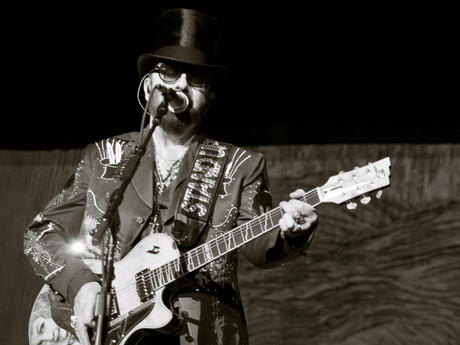
Want all the hottest music and gear news, reviews, deals, features and more, direct to your inbox? Sign up here.
You are now subscribed
Your newsletter sign-up was successful
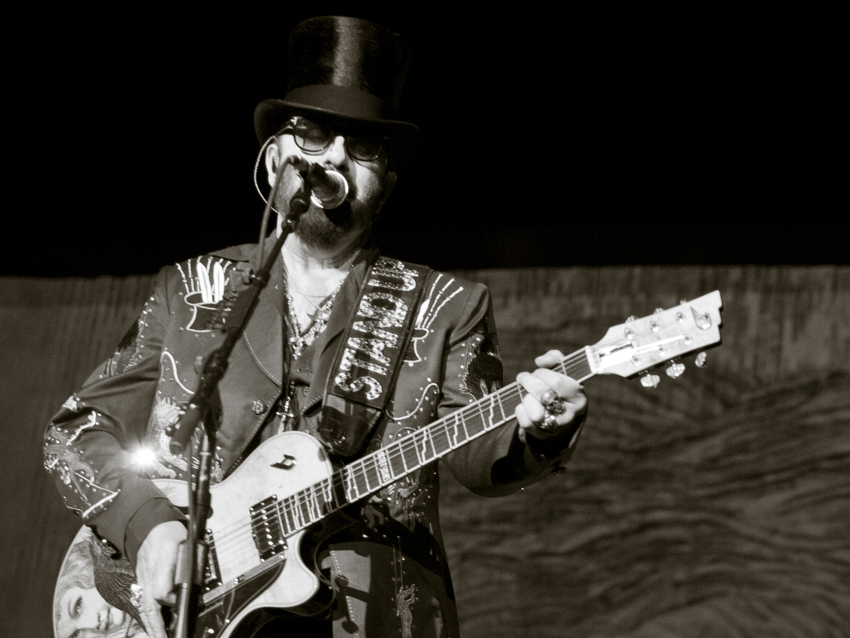
Dave Stewart triumphs on The Ringmaster General, his second album in a year's time. © Andrew Phan
When we reach Dave Stewart on the phone, the Grammy-winning musician and producer is braving a rare windy, rainy day in Los Angeles. He's on his way to see a doctor, but he assures us it's nothing serious - although for a musician, it could have been: "I'm getting some pins taken out of my hand," he says. "I sort of damaged a knuckle and broke my little finger on the car door, and I had these big skull rings on. It'll be OK, though - it'll have to be."
A moment's distraction, a car door slams - happens to us all. And Stewart would be the first to admit to a certain degree of preoccupation. In the last year, he's released his own album, The Blackbird Diaries; overseen projects for Stevie Nicks, Orianthi and Joss Stone; launched a signature guitar with Duesenberg, the Dave Stewart Blackbird; taken part in the all-star band Super Heavy; co-wrote the score for Ghost The Musical; and during a spare moment, he sold a TV pilot to ABC (Malibu Country, currently filming with Reba McEntire and Lily Tomlin).
The flurry of activity continues unabated in 2012, which will see the September release of Stewart's new album, The Ringmaster General. His second set of songs written and recorded in a year's time at Blackbird Studios in Nashville, The Ringmaster General sees Stewart duetting with Alison Krauss (the plaintive, sumptuous Drowning In The Blues), Diane Birch (the hip-swiveling country rocker Just Another Fall) and Jessie Baylin (God Only Knows You Now, an aching ballad).
Friends and comrades Joss Stone and Orianthi also turn in feisty guest spots on vocals and guitar, respectively, but front and center on The Ringmaster General is Stewart, whose rich tenor veers from heart-on-his-sleeve sincerity to bemused irony.
Complementing the new album, Stewart is readying a feature-length documentary (which chronicles the making of The Blackbird Diaries, as well) and is about to launch his own wine called - what else? - The Ringmaster General. While fighting sheets of rain, Stewart talked with us all about it all.
Your own wine... One would assume you're a wine aficionado.
Want all the hottest music and gear news, reviews, deals, features and more, direct to your inbox? Sign up here.
"Well, my wife is French, and I lived in France for a while. Roundabout 1984, I became nuts about various wines and have been ever since. I'm also a big vodka martini fan. The problem is trying not to jumble them up."
So what's more rock 'n' roll, wine or martinis?
"A vodka martini is great about 7:30 in the evening if you're not playing live or you're not in the studio. Because of all the chaos in a day, a vodka martini before dinner is good because it can knock you senseless for half an hour or so.
"Wine is great with dinner, or if you're hanging out after a gig. You can't keep drinking vodka martinis all night or you'd be flat on your face. And wine is good at lunchtime or during the afternoon… I sound like a drunk! [laughs] 'Sure, wine is good for breakfast…' [laughs]
You've done two albums in the space of a year. Obviously, you still believe in the album format.
"Yeah, absolutely. I'm nuts about vinyl and have a huge vinyl collection. I've just done the vinyl for The Ringmaster General, so that's going to be pressed up. I suppose I'm a bit like Jack White - I like going to the actual vinyl factory and watching it all work. It's like Willy Wonka And The Chocolate Factory - there's all these machines doing stuff, and this squashed bit of plastic comes out, gets turned into grooves and then sound comes out of it. It's magic."
How would you say The Ringmaster General differs from The Blackbird Diaries? Or does it - are the two albums one continues theme?
"It's one continuous theme - that's why the movie is called The Blackbird Diaries And The Ringmaster General. It's the same guys playing in the band, although I have various people on different tracks. It's the same ride, just with different scenery. The singers are so different, but they all fit together. Maybe it's because the tracks are played by the same musicians."
You could make albums anywhere you like, but Nashville continues to inspire you.
"A lot of it has to do with the people. John McBride - I love his whole demeanor. The feeling he's created at Blackbird Studios is great. He's a mad audio freak, and he's got all these amazing old amplifiers, old microphones from the '30s, all this vintage gear. And the players are fantastic. They're great guys, and they've become great friends.
"You know, like in Mississippi or in Memphis, as soon as you get there you feel this atmosphere of blues, well, in Nashville it's a country-blues feeling. All the players are great at rock, but I like getting the country-blues thing out of them. It's like rock but with a twang of blues and an edge of country."
How was it working with Alison Krauss?
"It was great. We got on really well. She liked the song straight away, and she spent a bit of time thinking about the harmonies. Her son came in the studio and we had a lot of fun. It seemed as if we knew each other for years."
This is the second time you've worked with Orianthi. You two have a good thing going.
"We do. She was in Nashville the whole time I recorded. She would come to the studio every day and just watch. I recorded her EP that's on iTunes, and then she played on Girl In A Catsuit. That was a particularly crazy night when we were all drinking vodka martinis. [laughs] The song was one take; it was all about what was happening."
It's interesting about Orianthi: she's a schooled shredder, but she rocks very easily; there's nothing technical about how she plays.
"I know what you mean. I think a lot of people have heard only one side of her. Orianthi and I have written a film that's full of music we're doing together, and it's totally based on blues. I was playing her RL Burnside and "Booba" Barnes and all these old blues players, and it wasn't like she had to go off and learn it - she could immediately play in that field.
"She's an all-around great guitarist. It's funny, because she's been put into this pop box with shredding on it. She didn't want to be in that box. She wants to play rock music, so that's what we did when she came down to Nashville."
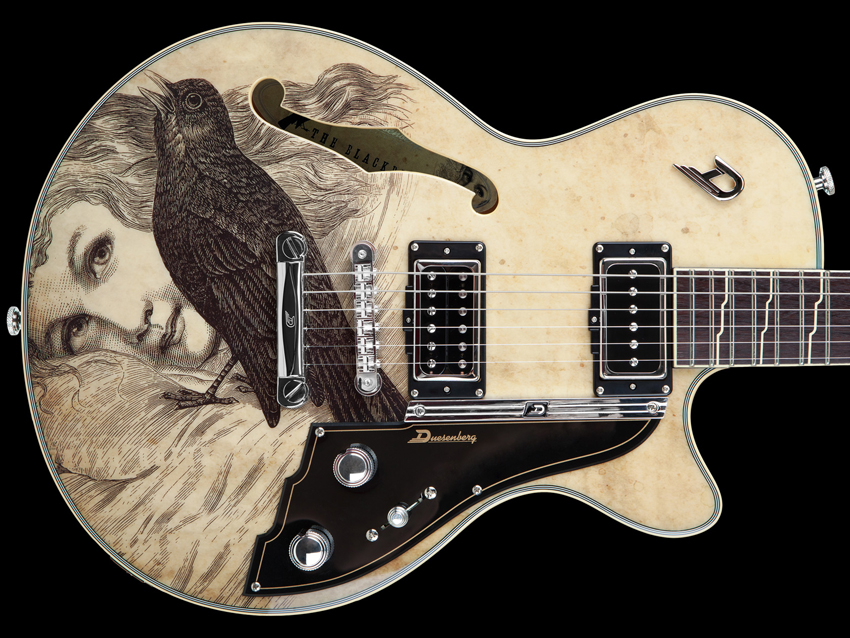
Body detail of the Duesenberg Dave Stewart Blackbird Signature guitar.
You said you wrote the songs on the spot and recorded them. You didn't do any demos at all?
"The only demos were me strumming an acoustic guitar and singing into my wife's iPhone. They were just snatches of ideas that she would have to e-mail to me in Nashville. I would listen to them, and they'd trigger something and that would start the whole song."
Last year, we talked about a lot of the guitars you used on The Blackbird Diaries. Anything new on this album?
"I tend to plunder when I get to Nashville. John McBride has lots of guitars. And [guitarists] Tom Bukovac and Dan Dugmore, they have these small-bodied Gibsons and high-strung guitars. Depending on what I play, if I say, 'The song goes like this,' everybody discusses the guitars. So it could be a Fender Jaguar or a Gibson 12-string. Everybody puts their hands into the cookie jar of instruments."
Did you use your Duesenberg Blackbird signature model?
"Yeah, that guitar is incredible to play. It was Mike Campbell who gave me a Duesenberg in the first place, this amazing blue model, which is his signature guitar. When Duesenberg realized what he had given me, and once they heard about what I was doing, they said that they would love to do a series with me.
"I told them that I loved this illustration on The Blackbird Diaries, which is this picture from the 1880s. To me, it wasn't just any old picture. I seem to be winding up with women as my muse, or maybe I'm their muse - but the picture was quite symbolic. There's a blackbird, which is up first in the morning singing a melody, and the girl's face lying down behind the bird… It really struck me."
What kind of amps do you like to pair the Blackbird guitar with?
"There's one in the studio I like a lot, a Divided By 13. I have that permanently miked up, and the Duesenberg goes through that. But I also like playing through Vox AC30s. I tend to like the distortion to come from the amp, just by turning the gain up.
"I try to avoid foot pedals, but there are some good ones I'm using. I did some [TC Electronic] TonePrints recently - I made one where you can get the sound I used on Super Heavy. And for years I liked this crazy guy who makes these [Lovetone] pedals with names like the Big Cheese or Brown Sauce. They're good, kind of warm sounding.
"I like the Voodoo pedals, and there's one called a [Demeter] Tremulator… You find the odd ones here and there that you want to keep. I'll tell you what I use a lot and that's an old tape echo, one I can control myself. I can get all those trippy dub effects."
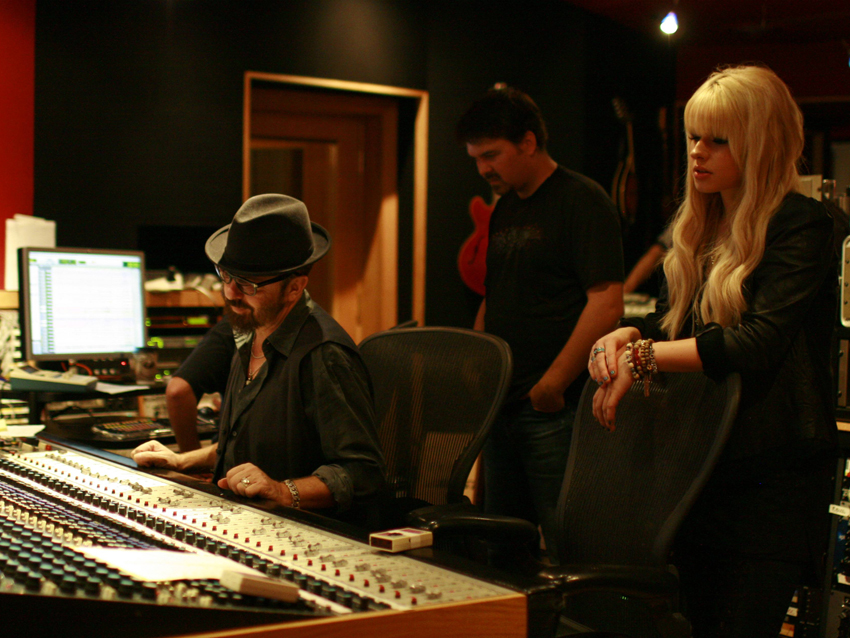
Stewart at the desk in Blackbird Studios with Orianthi.
Back in the '80s, when Eurythmics first came on the scene, you were working with synths. How fascinated were you by synth technology then?
"Well, see, before then, I had been going back and forth to a studio in Cologne that was owned by a man named Conny Plank. He produced Kraftwerk and Devo. Conny and this guy named Holger Czukay would play with all of these amazing old analog synthesizers, creating loops and random generated stuff, putting real instruments on top of it all.
"There was a band DAF - Deutsch Amerikanische Freundschaft - and they would play with a sequencer, a tough-sounding sequencer, but they had a real drummer, Robert Gorl. And there was a band from Paris called Kas Products. This was the gang that I would hang out with. I studied synthesizers and technology, but not in a pop way. It was a very unusual, avant-garde way."
Do you follow current computer music?
"Yeah. For 15 years I've worked with a fantastic engineer and programmer named Ned Douglas. And now, of course, there's the software and plug-ins. But I'll tell you, I tend to go back to liking the old analogue synths and using them occasionally as an effect."
At a certain point, your music became much more guitar based. When did you fall back in love with the guitar? Or did you never fall out of love with it?
"The thing is, I was in a guitar band before Eurythmics called The Tourists. We modeled ourselves after The Byrds and Love. While we were doing that, punk happened, so we were doing that, but it was sped up about three times what it should have been."
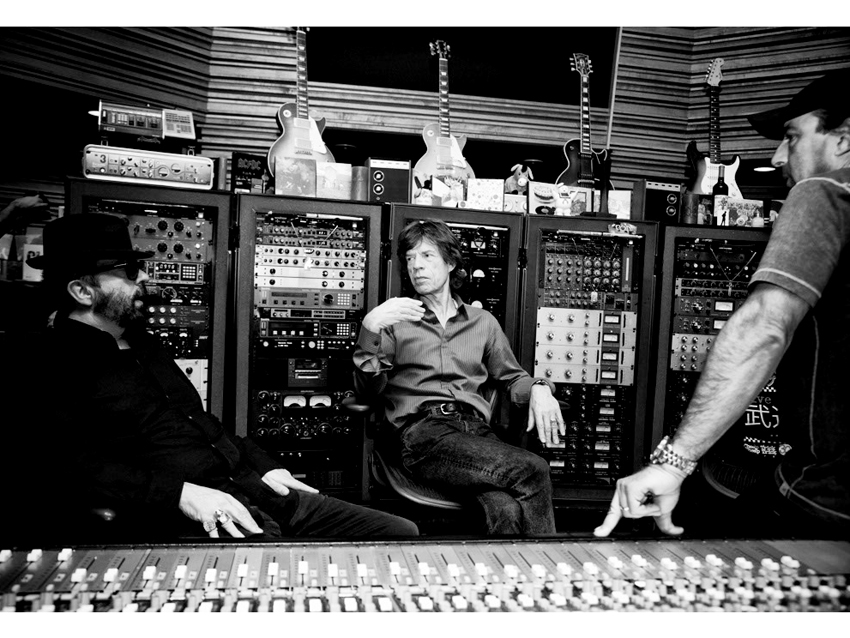
Stewart in the studio with one of his first idols, and now Super Heavy band mate, Mick Jagger, along with mixer Chris Lord-Alge. © Kristin Burns
Growing up, who were your guitar influences?
"I suppose Keith Richards, riffs-wise. A few others, like Neil Young. I'm a mixture of certain bands and styles. Stephen Stills is another, and Ronnie Wood for slide guitar. I was influenced by George Harrison from his solo period, the All Things Must Pass album, the melodic soloing.
"John Martin - when I was younger, I supported him on tour, and I saw him use his acoustic guitar with delay effects and things. There's others, too: Stefan Grossman, Mississippi John Hurt, Robert Johnson and Big Bill Broonzy. I got The Rolling Stones' first EP, and then I got into bands that were influenced by the blues.
"I was guitar mad, you see. From the age of 14 till about 22, that's all I would do - I devoured any guitar type of music, anything guitarish, it could be Traffic or bands like Heads Hands & Feet."
How come you were never a Traveling Wilbury? Seems like you know or knew everybody involved.
"I was kind of the host/virtual member. They recorded it all in my house. I put Dylan together with Tom Petty - he said he always missed having a band that was like a band, and I said the only band to be in was the Heartbreakers. George Harrison was living in my house in Encino at the time. Everybody met up there.
"I was busy doing quite a few things in England. That Wilburys thing happened really quickly. It all took place around my kitchen table and in my garden. I introduced everybody, went off, and when I came back they had already done it."
Joe is a freelance journalist who has, over the past few decades, interviewed hundreds of guitarists for Guitar World, Guitar Player, MusicRadar and Classic Rock. He is also a former editor of Guitar World, contributing writer for Guitar Aficionado and VP of A&R for Island Records. He’s an enthusiastic guitarist, but he’s nowhere near the likes of the people he interviews. Surprisingly, his skills are more suited to the drums. If you need a drummer for your Beatles tribute band, look him up.
